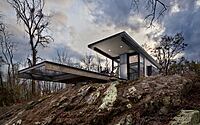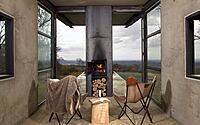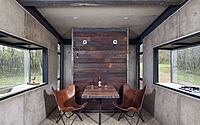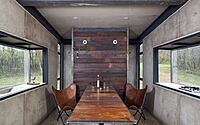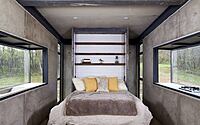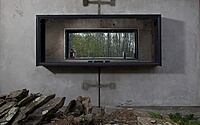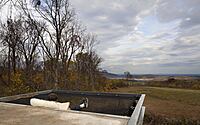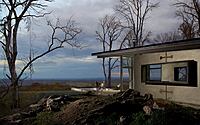Lost Whiskey Cabin: Minimalist Retreat in Virginia
Step inside the Lost Whiskey Cabin and discover a world where time slows down, designed by the visionary team at Greenspur. Nestled in the heart of Delaplane, Virginia, this Scandinavian-inspired minimalist cabin covers a cozy 160 sq. ft. (14.86 sq. meters), perfectly blending state-of-the-art off-grid technology with a deep respect for nature. Moreover, its robust concrete structure stands as a testament to sustainable living, promising durability with minimal maintenance. Furthermore, Greenspur has artfully fused the rustic allure of the Virginia countryside with a sleek, eco-conscious aesthetic.
This cabin isn’t just a space; it’s a transformative experience that beckons you to disconnect, relax, and rekindle the joys of simple living, all while surrounded by the historic and scenic backdrop near Washington D.C.








About Lost Whiskey Cabin
The Dawn of the iPhone Era
In 2007, the world changed dramatically with the introduction of the first iPhone, radically altering our daily routines within a mere two decades. Consequently, it can order pizza, stream global news, and capture life’s every detail in stunning 4K. Admittedly, I’m hooked, as are my children, and, regrettably, it hasn’t been entirely positive for our family dynamic.
Introducing the Lost Whiskey Project
Moreover, The Lost Whiskey Project invites us to embrace a slower pace and a simpler lifestyle. It places a premium on time and experiences rather than information and possessions. Spanning 160 sq. ft. (14.86 sq. m.), this cabin combines Scandinavian minimalism with Virginia’s pastoral aesthetics. Inside, a wood-fired hot tub, solar panels, cisterns, a Murphy bed, shower, and compost toilet make this off-grid retreat virtually maintenance-free. Remarkably, it should stand the test of time, looking and functioning the same in a hundred years. However, the true enchantment lies in the escape it offers: amongst the trees, under a warm blanket, lost in a good book, and ideally, sharing a meaningful conversation.
The Architect’s Vision
As we become more digitally connected, we seem to grow emotionally distant. Thus, the Lost Whiskey initiative inspires a reprieve from digital consumption. It encourages guests to turn off their devices, soak in the scenery, and, most importantly, connect with each other. Correspondingly, Harvard’s 80-year study revealed that happiness hinges on meaningful relationships, overshadowing social class, intelligence, or genetics. This project personifies that philosophy and manages to do so while minimizing its environmental footprint.
Embracing Virginia’s Heritage
Located just outside Marshall, VA, the project’s name—Lost Whiskey—reflects its historic surroundings near Whiskey Hollow and Lost Mountain, areas with profound national significance. Nestled on 50 acres (202,343 sq. m.) and an hour from Washington DC, this site is enveloped by the Appalachian Trail and the lush Virginia Hunt & Wine country, flanked by vast expanses of protected land.
Within this residence’s 160 sq. ft. (14.86 sq. m.) layout, functionality meets form. The structure features a concrete base, with pre-cast walls manufactured for expedient onsite assembly. Similarly, the roof comprises concrete-skinned SIPs for enduring quality. Internally, the design philosophy favors raw materials, with exposed concrete surfaces tempered by the warmth of reclaimed wood and leather touches.
As for unique elements, the self-heated hot tub truly stands out, ingeniously employing wood fire and copper coils. Facing the design and construction, the primary challenge was erecting a concrete cabin atop a mountain. Winter conditions severely limited access, compelling the drilling of a 700-foot (213 m) well for water. Furthermore, the logistics of hauling prefabricated concrete panels up the mountain was an arduous endeavor, yet it was accomplished with resourcefulness and perseverance.
Photography by Mitch Allen
Visit Greenspur
- by Matt Watts